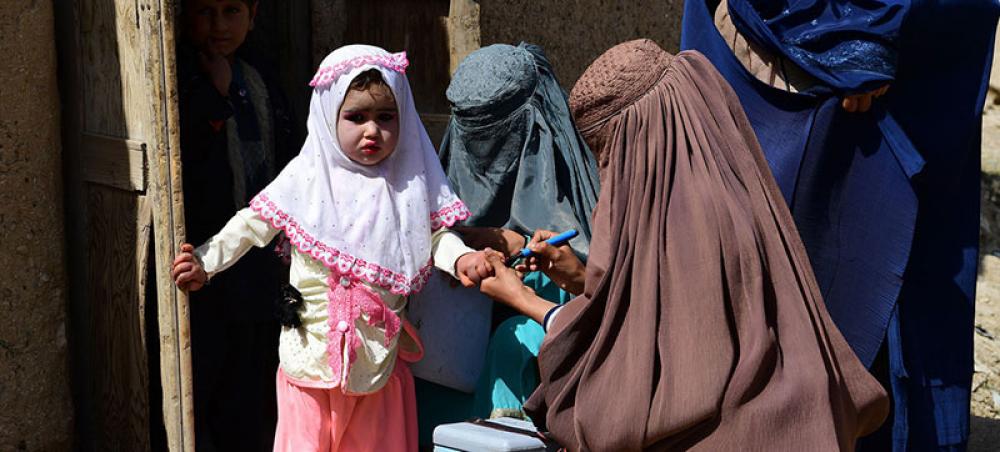Just Earth News | @justearthnews | 19 Oct 2021

Image: UNICEF/Frank Dejongh
New York: The decision by the Taliban leadership to support the resumption of house-to-house polio vaccination across Afghanistan has been welcomed by the World Health Organization (WHO) and the United Nations Children’s Fund (UNICEF).
The vaccination campaign will begin on 8 November, and will be the first in over three years to reach all children in Afghanistan.
This includes more than three million children in parts of the country who have previously remained inaccessible to inoculation campaigns against the infectious disease, which can cause paralysis and death.
A second nationwide vaccination campaign will also take place alongside Pakistan’s national polio inoculation drive in December. “We know that multiple doses of oral polio vaccine offer the best protection”, Dapeng Luo, WHO Representative in Afghanistan said. “Sustained access to all children is essential to end polio for good.  This must remain a top priority”.
‘Extraordinary opportunity’
With only one case of wild poliovirus reported this year in Afghanistan, the country has an “extraordinary opportunity” to eradicate the disease, WHO said.
Restarting polio vaccination now, is crucial for preventing any significant resurgence of polio within the country and mitigating the risk of cross-border and international transmission, the agency reiterated.
A supplementary dose of vitamin A will also be provided to children aged 6 to 59 months, during the upcoming campaign. “To eliminate polio completely, every child in every household across Afghanistan must be vaccinated, and with our partners, this is what we are setting out to do,” Hervé Ludovic De Lys, UNICEF Representative in Afghanistan said.
Measles, COVID shots
The polio programme is a result of ongoing high-level talks between the UN and the Taliban leadership to urgently meet the health needs of the people in Afghanistan.
To mitigate against the risk of a rise in diseases overall, and deaths, all parties have also agreed on the need to immediately start measles and COVID-19 vaccination campaigns.
This will be complemented with the support of the polio eradication programme and with outreach activities that will urgently begin to deliver other life-saving vaccinations through the national expanded programme for immunization, WHO noted.
‘Joint commitment’
“The urgency with which the Taliban leadership wants the polio campaign to proceed, demonstrates a joint commitment to maintain the health system and restart essential immunizations to avert further outbreaks of preventable diseases,” Dr Ahmed Al Mandhari, WHO Regional Director for the Eastern Mediterranean said. 
WHO has, however, reiterated that the overall health system in the country remains vulnerable.
Filling the gaps
The International Organization for Migration (IOM) says it is rapidly preparing to fill urgent gaps to help ensure that the Afghan healthcare system does not collapse in the medium term.
Currently, seven of IOM's eight mobile health teams (MHTs) are operational in four border provinces. Assistance is also planned to be expanded imminently to Kabul, the western province of Ghor, and the northern provinces of Balk, Badakhshan and Badghis.
In these northern provinces, IOM said it is scaling up to further support the Provincial Public Health Department with MHTs, rapid response teams (RRTs) for COVID-19 and additional vaccinators.
Security paramount
WHO emphasized that the safety and security of health workers remain a prime concern for the polio programme.
The Taliban leadership has expressed their commitment for the inclusion of female frontline workers and for providing security and assuring the safety of all health workers across the country, the Organization said.
WHO and UNICEF have called on authorities and community leaders at all levels to respect and uphold the neutrality of all health interventions, and ensure unhindered access to children now, and in the future.